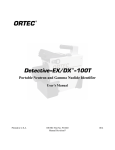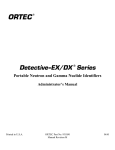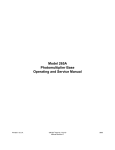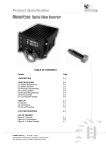Download WATSON INDUSTRIES GGC-E101 Owner`s manual
Transcript
GPS GYRO COMPASS SYSTEM OWNER'S MANUAL PART NUMBER: GGC-E101 GPS Module and Dual Antenna System WATSON INDUSTRIES, INC. 3035 MELBY STREET EAU CLAIRE, WI 54703 Phone: (715) 839-0628 FAX: (715) 839-8248 email: [email protected] Watson Industries, Inc. GGC-E101 Rev A 08/30/2013 1 TABLE OF CONTENTS 1. Introduction ........................................................................................................ 3 2. Product Description............................................................................................ 3 3. Installation .......................................................................................................... 3 Environment .................................................................................................................................................3 Calibration ....................................................................................................................................................3 Orientation....................................................................................................................................................4 Figure 1 – Alignment....................................................................................................................................4 Mounting ......................................................................................................................................................4 Power / Connectors.......................................................................................................................................4 Figure 2 – GGC-E101 Stowed......................................................................................................................5 Deployment ..................................................................................................................................................5 Figure 3 – Deployment .................................................................................................................................6 Stowing.........................................................................................................................................................6 Figure 4 – Stowing .......................................................................................................................................7 4. Operation ............................................................................................................ 8 Power Up......................................................................................................................................................8 Figure 5 – GGC-E101 Deployed ..................................................................................................................8 Initialization..................................................................................................................................................8 Normal Operation.........................................................................................................................................9 5. Standard RS-232 Digital Output ........................................................................ 9 $GPHDT Message Format .........................................................................................................................10 $GPGGA Message Format.........................................................................................................................10 $GPGLL Message Format..........................................................................................................................12 $GPVTG Message Format .........................................................................................................................13 $GPRMC Message Format.........................................................................................................................14 6. 7. 8. 9. Optional RS-232 Digital Output ...................................................................... 16 Mating Cable / Connections............................................................................. 17 Specifications ................................................................................................... 18 Dimensions....................................................................................................... 19 Figure 6 GGC-E101 ...................................................................................................................................19 Warning ......................................................................................................................................................20 10. Customer Service ............................................................................................. 21 11. Appendix A ...................................................................................................... 22 12. Appendix B....................................................................................................... 24 Determining and Setting Output Channels .................................................................................................24 Setting Output Format ................................................................................................................................25 Setting Heading Mode................................................................................................................................25 Watson Industries prides itself on solving customer problems and serving their needs in a timely fashion. This manual is intended to facilitate this goal and to provide written information about your product. We ask that you carefully read this manual. Becoming familiar with the manual will help you understand the product’s capabilities and limitations, as well as provide you with a basic understanding of its operation. If, after reading the manual, you require further assistance, do not hesitate to call Watson Industries with your questions and comments. Watson Industries, Inc. GGC-E101 Rev A 08/30/2013 2 CAUTION! Watson Sensors are rugged devices that have been used successfully in a number of harsh environments. The components have been qualified to withstand a mechanical shock of 200g 's or greater, and most enclosures provide an added level of protection. However, dropping a sensor from waist height onto a hard floor can cause a shock level of 600g's. At this level, damage is likely to occur. Introduction The GPS Gyro Compass System (GGC-E101) is a solid-state sensor system that provides the user with dynamic measurements of Angular Attitude and Heading, together with GPS output messages. This System consists of a DMS unit and two mounted GPS antennas inside a water-resistant carry case. Product Description Watson Industries GGC-E101 uses solid-state gyros and silicon accelerometers. The solid state vibrating structure angular rate gyros used in this system provide extremely high reliability, high precision, low power consumption and shock resistance. There are no physical adjustments required by the user since all of the primary transducers are locked into position during manufacture. The GGC-E101 incorporates a dual antenna Differential GPS (DGPS) system that allows the GGC to output true North heading. This unit outputs Altitude, Latitude and Longitude based on the position of the aft antenna. This unit will operate in two heading modes. The unit operates in true North heading mode (“G” label header on output message) when in dual antenna GPS is valid. In the event of loss of the GPS signal, the unit switches to relative heading (“I” label header on output message) based on the last accurate GPS heading. When GPS signal is restored, the unit reverts to true North heading when dual antenna GPS is restored. The user may select to hold the unit in relative heading mode full time. (See Appendix A Setting Velocity and Heading Modes) Installation Environment Avoid mounting sites that are subject to significant temperature changes over the duration of the test. Temperature variation could induce noticeable rate sensor bias drift, which could result in degraded attitude accuracy. This sensor system is housed in a water-resistant case. This case is air transportable and buoyant. The GGC is a rugged device and will withstand harsh environments. However, due attention needs to be paid to the nature of the sensor and its prime function, which is to measure attitude and motion. Calibration The GGC is calibrated at the factory before it is shipped to the user. It is recommended that the unit be returned to the factory annually for evaluation and recalibration. Watson Industries, Inc. GGC-E101 Rev A 08/30/2013 3 Orientation The GGC unit side that has carrying handle needs to be aligned along the heading direction. See Figure 1. Heading Direction Figure 1 – Alignment Handle Mounting The GGC-E101 case needs to be placed on a flat horizontal surface. Unsnapping the four plastic clasps opens the GGC case. The case cover needs to be fully opened so that the cover is below the antennas when they are deployed to avoid interference with the GPS satellite signals. Power / Connectors This unit has an internal regulator to allow operation over a wide voltage input range. Best operation is obtained at either 24 or 28 VDC, although operation is fully satisfactory down to 15 VDC and up to 35 VDC. Power draw of the unit is about 7 Watts. The GGC power system is isolated from the GGC signal system. The 65-meter mating cable (GGC Cable –65) for this unit is included and coiled inside the lid. This cable needs to be attached to a power supply and a computer to receive data. The cable is removed by opening the five straps that secure the cable. The necessary length of cable can then be uncoiled. The Red and Black wires need to be connected to the DC power Supply. The Orange, White and Brown wires need to be connected to the RS-232 port of data collection computer. For more information on the cable hookup see page 17. Watson Industries, Inc. GGC-E101 Rev A 08/30/2013 4 Wire straps Metal clasp Antenna arm Antenna assembly straps Figure 2 – GGC-E101 Stowed Deployment After the unit is aligned and connections have been completed, the antennas can be deployed. See Figure 3 for information on deploying the antennas. First open the two straps that secure the antenna assembly. Now pivot the assembly up and toward the side of the case. Be careful not to pinch your fingers between the antenna assembly and case side. Next swing the left-hand antenna arm counterclockwise until it is fully extended. Please note that the antenna arms are secured with Velcro patches. Use the left-hand metal clasp to secure this antenna arm in its extended position. Now swing the right-hand antenna arm counterclockwise until it is fully extended. Use the righthand metal clasp to secure this antenna arm in its extended position. The GGC needs an Watson Industries, Inc. GGC-E101 Rev A 08/30/2013 5 unobstructed view of the entire sky to receive signals from GPS satellites. The GGC is now ready to operate. See the Operation Section on page 8. Step 1 – Open Case Step 2 – Raise Antenna Assembly Step 3 – Extend antenna arms and secure metal clasps Figure 3 – Deployment Stowing When finished taking measurements with the GGC it is time to repack the unit. First shutoff the DC power supply to the unit and remove Red and black wires from power supply. Next disconnect Watson Industries, Inc. GGC-E101 Rev A 08/30/2013 6 the RS-232 serial connection to the computer. See Figure 4 for information for help in stowing the antenna assembly and cable. Now unclasp the right-hand antenna and swing the antenna arm clockwise to the stowed position. Next unclasp the left-hand antenna and swing the antenna arm clockwise to the stowed position. Make sure the two straps that secure the antenna assembly are open and out of the way. Pivot the antenna assembly down and into the bottom of the case. Be careful not to pinch your fingers between the antenna assembly and case bottom. Now the antenna assembly can be secured by closing the straps. Next the Power/signal cable needs to be stowed. Make sure the five straps that secure the cable are open and out of the way. Rewind the cable onto its holder inside the cover. Secure the cable by closing the five straps. Close the cover and secure by snapping the four plastic clasps. Step 1 – Release metal clasps and stow antenna arms. Step 2 – Lower Antenna Assembly Step 3 – Close Case Figure 4 – Stowing Watson Industries, Inc. GGC-E101 Rev A 08/30/2013 7 Operation Power Up The GGC unit output messages can be read by using a terminal program. Now it is time to power up the data collection computer and start the terminal program for the serial port connected to the GGC. Next the power needs to be switched on for the GGC unit. Figure 5 – GGC-E101 Deployed Initialization Ideally, the GGC should be stationary and level when it is turned on. If not, the sensor readings may not be immediately accurate after initialization. The time required for the initialization process takes 4 to 5 seconds. During this time, a message is sent from the unit via the RS-232 serial link. This message gives information about the GGC such as the full model number, serial number, and software revision. Watson Industries, Inc. GGC-E101 Rev A 08/30/2013 8 Example of the GGS header: GGC-E101 INITIALIZING SERIAL NUMBER - 0177 LAST CALIBRATED - 10/12/10 SOFTWARE VERSION - GG01_00A 2010-12-13 COPYRIGHT (C) 1990 THROUGH 2010 WATSON INDUSTRIES, INC. Normal Operation During normal operation, the GGC will output highly accurate inertial data for the user to interpret. This data is transmitted using the RS-232 serial output. The unit also relays GPS messages. The exact formatting structure is discussed later in the Interface section of this manual. In normal operation, the GGC takes data from its rate sensors and integrates in a closed loop system, with the accelerometers as a long-term reference, to generate Bank, Elevation and Heading data. In most cases, these algorithms provide for very stable and accurate output signals; however, the user should be aware that exceeding the normal ranges of the sensors would affect accuracy. The GGC gyros have a maximum rate of 100°/s. Care should be taken not to exceed this rate because the closed loop system will receive inaccurate data. This will result in errors in the angle output signals. The GPS Velocity data is used to assist in the correction of errors. The internal GPS receiving unit provides this signal. The Heading Angle is referenced to the fore-aft alignment of the two GPS antennas using the true North GPS Heading (the string start label is “G”). If GPS becomes unavailable, relative heading will be maintained (the string start label is “I”). While this GGC is "all attitude", the accuracy deteriorates rapidly when its forward direction is within about 5 degrees of vertical. Operation for any extended period of time in this orientation is not recommended. If these few operational precautions are observed, the GGC should provide very accurate data for a wide variety of applications. Standard RS-232 Digital Output The standard RS-232 output consists of a five NMEA GPS messages. These strings of decimal ASCII characters sent asynchronously at regular intervals. Nominally, the string is sent at 9600 baud with eight data bits, one stop bit and no parity. The mating cable for the GGC is included. The RS-232 signal is referenced to signal ground. The frame rate is 1 frame of five GPS messages per second. The five GPS messages are GPHDT, GPGGA, GPGLL, GPVTG, GPRMC. The unit is shipped configured for this output. Here is an example of the five string frame: $GPHDT,175.58,T*0C $GPGGA,175612.00,4451.84239,N,09128.00147,W,2,06,1.1,275.2,M,-33.0,M,6.0,0133*7B $GPGLL,4451.84239,N,09128.00147,W,175612.00,A,D*78 $GPVTG,186.55,T,187.35,M,0.13,N,0.24,K,D*25 $GPRMC,175612.00,A,4451.84239,N,09128.00147,W,0.13,186.55,081210,0.8,W,D*39 Watson Industries, Inc. GGC-E101 Rev A 08/30/2013 9 $GPHDT Message Format The $GPHDT consists of a string ASCII characters sent asynchronously at regular intervals. The string is sent at 9600 baud with eight data bits, one stop bit and no parity. The contents of this string are formed as follows: $GPHDT,xxx.xx,T*cc<CR><LF> 1. The ”$GPHDT” header indicates the start of the data string. . This data is followed by a comma. 2. “xxx.xx” is a variable character string (minimum-4, maximum-6) representing the gyro stabilized true North heading 0.00 to 359.99 degrees. This data is followed by a comma. 3. “T” is a single character representing the true North heading. 4. “*cc” is a three character string representing an asterisk followed by a two digit hexadecimal checksum. 5. <CR><LF> The string is terminated by a carriage return and Line Feed. There will then be a short interval with no data transmission before the next string begins. Example: $GPHDT,175.58,T*0C $GPHDT message Header 175.58 True Heading 175.58 deg T True Heading *0C Checksum $GPGGA Message Format The $GPGGA consists of a string ASCII characters sent asynchronously at regular intervals. The string is sent at 9600 baud with eight data bits, one stop bit and no parity. The contents of this string are formed as follows: $GPGGA,hhmmss.ss,ddmm.mmmmm,s,dddmm.mmmmm,s,n,qq,p.p,saaaaa.a,M, ±xxxx.xx,M,sss,aaaa*cc<CR><LF> 1. The ”$GPGGA” header indicates the start of the data string. This data is followed by a comma. 2. “hhmmss.ss” is a nine character string representing the Universal time in “hh” hours, “mm” minutes, “ ss” seconds and “.ss” decimal fraction seconds at the GPS position. This data is followed by a comma. 3. “ddmm.mmmmm” is a nine character string representing the Latitude in “dd” degrees, “mm” minutes, and “.mmmmm” decimal fraction minutes. This data is followed by a comma. 4. “s” is a single character representing the Latitude direction. s = N for North Latitude, s = S for South Latitude. This data is followed by a comma. Watson Industries, Inc. GGC-E101 Rev A 08/30/2013 10 5. “dddmm.mmmmm” is an eleven character string representing the Longitude in “ddd” degrees, “mm” minutes, and “.mmmmm” decimal fraction minutes. This data is followed by a comma. 6. “s” is a single character representing the Longitude direction. s = E for East Longitude, s = W for West Longitude. This data is followed by a comma. 7. “n” is a single character representing the Quality indicator. n = 0 for no position, n = 1 for undifferentially correction position, n = 2 for differentially correction position, 9 = position computed using almanac. This data is followed by a comma. 8. “qq” is two characters representing the number of satellites used in position computation. This data is followed by a comma. 9. “p.p” is a three character string representing the Horizontal Dilution of Precision (HDOP) = 1.0 to 9.9. This data is followed by a comma. 10. “saaaaa.a” is a variable character string (minimum-3, maximum-8) representing the Antenna Altitude in meters above sea level. This data is followed by a comma. 11. “M” is the altitude units, meters. This data is followed by a comma. 12. “±xxxx.x” is a variable character string (minimum-4, maximum-7) representing the geoidal separation in meters. It difference between the WGS-84 earth ellipsoid and mean-sea-level (geoid). This data is followed by a comma. 13. “M” is the geoidal separation units, meters. This data is followed by a comma 14. “sss” is a variable character string (minimum-0, maximum-3) representing the age of Differential Corrections in seconds. Field blank if not Differentially corrected. . This data is followed by a comma 15. “aaaa” is a four character string representing Reference station identification (0000 – 1023). Field blank if not Differentially corrected. 16. “*cc” is a three character string representing an asterisk followed by a two digit hexadecimal checksum. 17. <CR><LF> The string is terminated by a carriage return and Line Feed. There will then be a short interval with no data transmission before the next string begins. Example: $GPGGA,175612.00,4451.84239,N,09128.00147,W,2,06,1.1,275.2,M,-33.0,M,6.0,0133*7B $GPGGA message Header 175612.00 Universal Time 17 Hrs 56 minutes 12.00 seconds 4451.84239 Latitude 44 deg 51.84239 minutes N North Latitude 09128.00147 Longitude 91 deg 28.00147 minutes W West Longitude 2 Quality factor = 2 Diff. Corrected Pos. Watson Industries, Inc. GGC-E101 Rev A 08/30/2013 11 06 6 satellites being used 1.1 HDOP = 1.1 275.2,M Altitude = 275.2 Meters geoidal separation –33.0 meters -33.0,M Differential Correction Age= 6.0 seconds 6.0 Reference Station Identification 0133 Checksum *7B $GPGLL Message Format The $GPGLL consists of a string ASCII characters sent asynchronously at regular intervals. The string is sent at 9600 baud with eight data bits, one stop bit and no parity. The contents of this string are formed as follows: $GPGLL,ddmm.mmmmm,s,dddmm.mmmmm,s,hhmmss.ss,a,i*cc<CR><LF> 1. The ”$GPGLL” header indicates the start of the data string. This data is followed by a comma. 2. “ddmm.mmmmm” is a nine character string representing the Latitude in “dd” degrees, “mm” minutes, and “.mmmmm” decimal fraction minutes. This data is followed by a comma. 3. “s” is a single character representing the Latitude direction. s = N for North Latitude, s = S for South Latitude. This data is followed by a comma. 4. “dddmm.mmmmm” is an eleven character string representing the Longitude in “ddd” degrees, “mm” minutes, and “.mmmmm” decimal fraction minutes. This data is followed by a comma. 5. “s” is a single character representing the Longitude direction. s = E for East Longitude, s = W for West Longitude. This data is followed by a comma. 6. “hhmmss.ss” is a nine character string representing the Universal time in “hh” hours, “mm” minutes, “ ss” seconds and “.ss” decimal fraction seconds at the GPS position. This data is followed by a comma. 7. “a” is a single character representing the Status. a = A for data valid, a = V for data invalid. This data is followed by a comma 8. “i” is a single character representing the Mode Indicator. i = A for Autonomous, i = D for Differential, i = E for Estimated. 9. “*cc” is a three character string representing an asterisk followed by a two digit hexadecimal checksum. 10. <CR><LF> The string is terminated by a carriage return and Line Feed. There will then be a short interval with no data transmission before the next string begins. Watson Industries, Inc. GGC-E101 Rev A 08/30/2013 12 Example: $GPGLL,4451.84239,N,09128.00147,W,175612.00,A,D*78 $GPGLL message Header 4451.84239 Latitude 44 deg 51.84239 minutes N North Latitude 09128.00147 Longitude 91 deg 28.00147 minutes W West Longitude 175612.00 Universal Time 17 Hrs 56 min 12.00 sec A Status = valid data D Mode Indicator = Differential *78 Checksum $GPVTG Message Format The $GPVTG consists of a string ASCII characters sent asynchronously at regular intervals. The string is sent at 9600 baud with eight data bits, one stop bit and no parity. The contents of this string are formed as follows: $GPVTG,ttt.tt,c,ttt.tt,c,ggg.gg,u,ggg.gg,u,i*cc<CR><LF> 1. The ”$GPVTG” header indicates the start of the data string. . This data is followed by a comma. 2. “ttt.tt” is a variable character string (minimum-4, maximum-6) representing the True course over ground. 0.00 to 359.99 degrees. This data is followed by a comma. 3. “c” is a single character representing true course over ground indicator. c = T (always) for True Heading. This data is followed by a comma. 4. “ttt.tt” is a variable character string (minimum-4, maximum-6) representing the Magnetic course over ground. 0.00 to 359.99 degrees. This data is followed by a comma. 5. “c” is a single character representing magnetic course over ground indicator. c = M (always) for Magnetic Heading. This data is followed by a comma. 6. “ggg.gg” is a variable character string (minimum-4, maximum-6) representing the speed over ground. 0.00 to 999.99 knots. This data is followed by a comma. 7. “u” is a single character representing speed over ground units. u = N (always) for Nautical mile/hour. This data is followed by a comma. 8. “ggg.gg” is a variable character string (minimum-4, maximum-6) representing the speed over ground. 0.00 to 999.99 km/hour. This data is followed by a comma. 9. “u” is a single character representing speed over ground units. u = K(always) for kilometer/hour. This data is followed by a comma. 10. “i” is a single character representing the Mode Indicator. i = A for Autonomous, i = D for Differential, i = E for Estimated. Watson Industries, Inc. GGC-E101 Rev A 08/30/2013 13 11. “*cc” is a three character string representing an asterisk followed by a two digit hexadecimal checksum. 12. <CR><LF> The string is terminated by a carriage return and Line Feed. There will then be a short interval with no data transmission before the next string begins. Example: $GPVTG,186.55,T,187.35,M,0.13,N,0.24,K,D*25 $GPVTG message Header 186.55 True Course over ground 261.74 degrees T True Heading 187.35 Magnetic Course over ground 262.26 degrees M Magnetic Heading 0.13 Speed over ground 0.13 knots N Knots 0.24 Speed over ground 0.24 Km/hr K Km/hr D Mode Indicator = Differential *25 Checksum $GPRMC Message Format The $GPRMC consists of a string ASCII characters sent asynchronously at regular intervals. The string is sent at 9600 baud with eight data bits, one stop bit and no parity. The contents of this string are formed as follows: $GPRMC,hhmmss.ss,ddmm.mmmmm,s,dddmm.mmmmm,s,zzz.zz,ttt.tt,ddmmyy,ddd.d,v, i*cc<CR> <LF> 1. The ”$GPRMC” header indicates the start of the data string. This data is followed by a comma. 2. “hhmmss.ss” is a nine character string representing the Universal time in “hh” hours, “mm” minutes, “ ss” seconds and “.ss” decimal fraction seconds at the GPS position. This data is followed by a comma. 3. “a” is a single character representing the Status. a = A for data valid, a = V for data invalid. This data is followed by a comma 4 “ddmm.mmmmm” is a nine character string representing the Latitude in “dd” degrees, “mm”minutes, and “.mmmmm” decimal fraction minutes. This data is followed by a comma. 5. “s” is a single character representing the Latitude direction. s = N for North Latitude, s = S for South Latitude. This data is followed by a comma. 6. “dddmm.mmmmm” is an eleven character string representing the Longitude in “ddd” degrees, “mm” minutes, and “.mmmmm” decimal fraction minutes. This data is followed by a comma. Watson Industries, Inc. GGC-E101 Rev A 08/30/2013 14 7. “s” is a single character representing the Longitude direction. s = E for East Longitude, s = W for West Longitude. This data is followed by a comma. 8. “zzz.zz” is a variable character string (minimum-4, maximum-6) representing the ground speed. 0.00 to 999.99 knots. This data is followed by a comma. 9. “ttt.tt” is a variable character string (minimum-4, maximum-6) representing the Track made good, referenced to true North.. 0.00 to 359.99 degrees. This data is followed by a comma. 10. “ddmmyy” is a six character string representing the UTC date of position fix. “dd” day, ”mm” month, “yy” year . This data is followed by a comma. 11. “ddd.d” is a variable character string (minimum-3, maximum-5) representing Magnetic Variation 0.0 to 180.0 degrees. This data is followed by a comma. 12. “v” is a single character representing the Magnetic Variation direction. s = E for East Longitude, s = W for West Longitude. This data is followed by a comma. 13. “i” is a single character representing the Mode Indicator. i = A for Autonomous, i = D for Differential, i = E for Estimated. 14. “*cc” is a three character string representing an asterisk followed by a two digit hexadecimal checksum. 15. <CR><LF> The string is terminated by a carriage return and Line Feed. There will then be a short interval with no data transmission before the next string begins. Example: $GPRMC,175612.00,A,4451.84239,N,09128.00147,W,0.13,186.55,081210,0.8,W,D*39 $GPRMC message Header 175612.00 Universal Time 21 Hrs 46 minutes 57.00 seconds A Status = valid data 4451.84239 latitude 44 deg 51.84043 minutes N North Lattitude 09128.00147 Longitude 91 deg 28.00263 minutes W West Longitude 0.13 Speed over ground 0.13 knots Track Made Good 186.55 degrees 186.55 UTC Date of postion fix 08 December 2010 081210 Magnetic Variation 0.8 degrees 0.8 West Magnetic Variation W Mode indicator = Differential D *39 Checksum Watson Industries, Inc. GGC-E101 Rev A 08/30/2013 15 Optional RS-232 Digital Output The optional RS-232 output consists of a string of decimal ASCII characters sent asynchronously at regular intervals. Nominally, the string is sent at 9600 baud with eight data bits, one stop bit and no parity. The mating cable for the GGC is included. The RS-232 signal is referenced to signal ground. The frame rate is 10 strings per second. See Appendices A and B for information on how to change the unit for this output. The contents of a string are formed as follows: 1. A single letter and a space used to indicate the start of the data string. The letter “G” indicates the start of an inertial data string with successful GPS data input. The letter “I” indicates the start of an inertial data string with GPS disabled or absence of valid GPS data. The letter “R” indicates the start of a Reference data string. If the letter is in lower case (“g”,“i”, or “r”), an error over-range condition is indicated This occurs when the calculated attitude or heading errors exceed preset ranges. Internal functions that require these error values are disabled while the condition exists. The system will continue to operate in an extended time constant mode with a low level of error accumulation until the condition is cleared. While maneuvering, occasional blips of this condition are expected with no detectable effect on the resulting data. 2. A nine character string representing the Universal Time (UTC) starting with six digits, a decimal point, one digit and a space for up to 235959.9 Hours minutes seconds tenth seconds (HHMMSS.S). Note: The field is filled with asterisks when the data is invalid. (“******.*”) 3. A seven character string representing the bank angle starting with a “+” or a “-“, followed by three digits, a decimal point, one digit and a space for up to ±179.9 degrees. 4. A six character string representing the elevation angle starting with a “+” or a “-“, followed by two digits, a decimal point, one digit and a space for up to ±89.9 degrees. 5. A six character string representing the heading angle by three digits, a decimal point, one digit and a space for zero to 359.9 degrees. 6. A seven character string representing the GPS Ground Track/Forward Velocity starting with a “+” or a “-“, followed by three digits, a decimal point, one digit and a space for up to ±399.9 Km/Hr. Note: The field is filled with asterisks when the data is invalid. (“****.*”) 7. A twelve character string representing the Latitude starting four digits, a decimal point, five digits, a comma, followed by an “N” or “S” and a space for up to ±89degrees 59.99999 minutes North or South. Note: The field is filled with asterisks when the data is invalid. (“****.****,*”) 8. A thirteen character string representing the longitude starting with a five digits, a decimal point, five digits, a comma, followed by a ”W” or “E” and a space for up to 179 degrees 59.99999 minutes East or West. The field is filled with asterisks when the data is invalid. (“*****.*****,*”) 9. A six character string representing the Altitude by five digits and a space for up to 21500 feet. The field is filled with asterisks when the data is invalid. (“*****”). Watson Industries, Inc. GGC-E101 Rev A 08/30/2013 16 10. The string is terminated by a carriage return. There will then be a short interval with no data transmission before the next string begins. Example: G 161409.9 ↑ (1) -000.8 ↑ UTC (2) space +00.1 ↑ Bank angle (3) space 273.4 +028.9 ↑ Elev. angle (4) space ↑ Head. angle (5) space 4451.84413,N ↑ Velocity (6) space space 09128.00182,W ↑ Latitude (7) 00894 <CR> ↑ Longitude (8) space ↑ Altitude (9) space (10) space Mating Cable / Connections The GGS-E101 is supplied with a 65 meter mating Cable (Part Number: GGC Cable –65). This cable terminated at one end with mating 10 pin MIL-C-26482 connector (MS3116F12-10S) and four inch wire lead (1” stripped and tinned) at the other end. 7 conductor mating Cable Connector Pin A B C D E F G H J K No Connection No Connection Wire Color Black Red No Connection Orange White Brown No Connection No Connection No Connection No Connection Green Blue Description Power Ground V+ Power In Not Used RS-232 RXD RS-232 TXD** Signal Ground Not Used Not Used Not Used Not Used Not Used Not Used **User Receives data from this line 1) 2) 3) 4) 5) Wiring direction for the mating cable GGC Cable –65) The Black wire is attached to the power supply Ground. The Red wire is attached to Power Supply V+ (unit will work from +18 to +35 VDC). The Orange wire is attached to the computers RS-232 transmit line (pin 3 on the 9-pin D-sub RS-232 connector). The White wire is attached to the computers RS-232 receive line (pin 2 on the 9-pin D-sub RS-232 connector). The Brown wire is attached to the computers RS-232 signal ground line (pin 5 on the 9-pin D-sub RS-232 connector). Note: The Green and Blue wires remain unconnected. Watson Industries, Inc. GGC-E101 Rev A 08/30/2013 17 Specifications Attitude Range: Bank Range: Elevation Resolution: Accuracy: Static * Accuracy: Dynamic Heading Range: Resolution: Accuracy: Static * Accuracy: Dynamic Angular Rate Range: Roll, Pitch, Yaw Resolution: Scale Factor Accuracy: Bias: Roll, Pitch, Yaw Non-Linearity: Bandwidth: Noise: Acceleration Range: X, Y, Z Range: Forward, Lateral, Vertical Resolution: Scale Factor Accuracy: Bias: X, Y, Z Non-Linearity: Bandwidth: GPS Positioning Range: Latitude Range: Longitude Range: Altitude Resolution: Latitude, Longitude Resolution: Altitude Accuracy: Latitude, Longitude Environmental Temperature: Operating Temperature: Storage Vibration: Operating Vibration: Survival Shock: Survival Electrical Frame Rate: Startup Time: Data † Startup Time: Satellite Acquisition ‡ Input Power: Input Current: Digital Output: Physical Axis Alignment: Size: Antenna Stowed Weight: Connection: * † ‡ • • ±180° ±75° 0.02° ±0.25° ±0.5% Binary mode (14 bit) 0° - 360° 0.02° ±0.3° RMS ±0.5% Binary mode (14 bit) Using GPS ±0.05°/sec (without GPS) ±100°/sec 0.025°/sec ±0.5% < 0.1°/sec < 0.1% 20 Hz < 0.02°/sec rms Binary mode (14 bit) Digital ASCII Full scale range ±10g ±10g 4mg 1% < 10mg 0.1% 3 Hz Full scale range ±90° ±180° 0ft to 21500ft 0.00001 minutes 2 ft ±0.6m (with DGPS) ±2.5m (without DGPS) -30°C to +70°C -55°C to +85°C 5g rms 10g rms 500g 20 Hz to 2 KHz 20 Hz to 2 KHz 10ms ½ sine wave 71.1 Hz 5 sec 5 min 18 to 35VDC 240mA @ 28VDC RS-232 Maximum Typical 7.0W 280mA @ 24VDC < 0.1° 24.3"W x 19.5"L x 8.7"H 37 lb MS3112E12-10P 61.7 x 49.5 x 22.1 (cm) 17 kg Mating: MS3116F12-10S Using velocity data with GPS mode on. Actual accuracy can be calculated as the listed percentage multiplied by the change in value over the entire dynamic maneuver. Acquisition time for GPS units is typical for the contiguous United States. Acquisition time may differ due to interference in your geographic area. Including losses using 65 meter cabling. Specifications are subject to change without notice. This product may be subject to export restrictions. Please consult the factory. Watson Industries, Inc. GGC-E101 Rev A 08/30/2013 18 Z Dimensions Z Handle X Z Y Figure 6 GGC-E101 Dimensions in inches Watson Industries, Inc. GGC-E101 Rev A 08/30/2013 19 X FORWARD Y Y X Warning Rough handling, dropping, or miswiring this unit is likely to cause damage. DISCLAIMER The information contained in this manual is believed to be accurate and reliable; however, it is the user’s responsibility to test and to determine whether a Watson Industries’ product is suitable for a particular use. Suggestion of uses should not be taken as inducements to infringe upon any patents. WARRANTY Watson Industries, Inc. warrants, to the original purchaser, this product to be free from defective material or workmanship for a period of two full years from the date of purchase. Watson Industries’ liability under this warranty is limited to repairing or replacing, at Watson Industries’ sole discretion, the defective product when returned to the factory, shipping charges prepaid, within two full years from the date of purchase. The warranty described in this paragraph shall be in lieu of any other warranty, express or implied, including but not limited to any implied warranty of merchantability or fitness for a particular purpose. Excluded from any warranty given by Watson Industries are products that have been subject to abuse, misuse, damage or accident; that have been connected, installed or adjusted contrary to the instructions furnished by seller; or that have been repaired by persons not authorized by Watson Industries. Watson Industries reserves the right to discontinue models, to change specifications, price or design of this product at any time without notice and without incurring any obligation whatsoever. The purchaser agrees to assume all liabilities for any damages and/or bodily injury that may result from the use, or misuse, of this product by the purchaser, his employees or agents. The purchaser further agrees that seller shall not be liable in any way for consequential damages resulting from the use of this product. No agent or representative of Watson Industries is authorized to assume, and Watson Industries will not be bound by any other obligation or representation made in connection with the sale and/or purchase of this product. PRODUCT LIFE The maximum expected life of this product is 20 years from the date of purchase. Watson Industries, Inc. recommends the replacement of any product that has exceeded the product life expectation. Watson Industries, Inc. GGC-E101 Rev A 08/30/2013 20 Customer Service All repairs, calibrations and upgrades are performed at the factory. Before returning any product, please contact Watson Industries to obtain a Returned Material Authorization number (RMA). Return Address & Contact Information Watson Industries, Inc. 3035 Melby Street Eau Claire, WI 54703 ATTN: Service Department Telephone: (715) 839-0628 Fax: (715) 839-8248 email: [email protected] Returning the Product Product shall be packaged making sure there is adequate packing around all sides. Please write the words, FRAGILE, DELICATE INSTRUMENT in several places on the outside of the shipping container. Correspondence shall include: • • • • • Customer’s Name and Address Contact Information Equipment Model Number Equipment Serial Number Description of Fault It is the customer’s responsibility to pay all shipping charges from customer to Watson Industries, including import and transportation charges. Watson Industries, Inc. GGC-E101 Rev A 08/30/2013 21 Appendix A The following data items are available in the Optional RS-232 Digital Output. Their full-scale ranges are listed. See Appendix B for more information. Inertial Output Full Scale Decimal Time UTC 1 HHMMSS ±179.9º ±89.9º 0.0 to 359.9º ±9.99 G ±9.99 G ±9.99 G ±9.99 G ±9.99 G ±9.99 G ±99.9 º/s ±99.9 º/s ±99.9 º/s ±99.9 º/s ±399.9 Km/hr ±89.99999 ±179.99999 21500 Feet -40º to 88ºC Bank Angle Elevation Angle Heading Angle X Accelerometer Y Accelerometer Z Accelerometer Forward Acceleration Lateral Acceleration Vertical Acceleration X Angular Rate Y Angular Rate Z Angular Rate Heading Rate Ground Track 2 / Forward Velocity Latitude 3 Longitude 3 Altitude 4 Temperature Status Bits Flag Bits 3 ASCII chars representing Octal digits 3 ASCII chars representing Octal digits 1 Note: The GPS universal time (UTC) field is filled with asterisks when the data is invalid. (“******”) 2 Note: The Ground Track Velocity field is filled with asterisks when the data is invalid. (****.*) 3 Note: The Latitude and Longitude fields are filled with asterisks when the data is invalid. (“****.*****,* *****.*****,*”) 4 Note: The Altitude field is filled with asterisks when the data is invalid. (*****) Watson Industries, Inc. GGC-E101 Rev A 08/30/2013 22 The Status Bits contain the following information: Bit Description (If Set) 0 Bank Error Flag 1 Elevation Error Flag 2 Heading Error Flag 3 System Error Flag 4 Velocity Error Flag 5 Ready Flag 6 Checksum Error Flag e.g. Status bit 6 bit 5 bit 4 bit 3 bit 2 bit 1 bit 0 = 040(octal) = 0 100 000 (binary) is reset - No Checksum Error is set - Ready is reset – No Velocity Error is reset – No System Error is reset – No Heading Error is reset – No Elevation Error is reset – No Bank Error The Flag Bits contains the following information: Bit Description (If Set) 0 GPS ground track heading data loss 1 GPS ground track velocity data loss 2 GPS true heading data loss 3 Reference Command selected 4 GPS enabled 5 Free Mode selected 6 Logic Input Switches disabled e.g. Flags = 120(octal) = 1 010 000 (binary) bit 6 is set - Logic Input disabled bit 5 is reset - not in Free Mode bit 4 is set - GPS enabled bit 3 is reset – not in Reference Mode bit 2 is reset - valid GPS true heading data bit 1 is reset - valid GPS ground track velocity data bit 0 is reset - valid GPS ground track heading data Watson Industries, Inc. GGC-E101 Rev A 08/30/2013 23 Appendix B Determining and Setting Output Channels For Optional RS-232 Digital Output To determine which channels are present. Hook the unit up to your computer’s serial port. Use a terminal program to interface with the unit. Turn on unit. Wait for the startup message to appear on display. Hit the space bar twice within the first 5 seconds of turn on. Sometimes it takes a few tries to get the hang of this. Wait 15 seconds. Now the unit will take in keyboard commands. To determine which channels are present, first type '&'. This will bring up the menu: TYPE IN 1 = 2 = 3 = 4 = 5 = THE NUMBER OF YOUR SELECTION (OR 'Q' TO QUIT): ADJUST TIME CONSTANTS SET OUTPUT CHANNELS LIST CURRENT OUTPUT CHANNEL SELECTION SELECT HEADING SOURCE SET NEW BAUD RATE Typing '3' will show which channels are currently active. To change which channels are output, type '&' (this will bring up the menu again). Now type '2' to set up the channels. The following message will appear: TO SET FOR OUTPUT FOR ANY OF THE FOLLOWING DATA ITEMS, PRESS Y TO AVOID ANY OF THE FOLLOWING DATA ITEMS, PRESS N TO QUIT AND DISREGARD ANY OTHER DATA, PRESS Q *** DO YOU WANT TO PROCEED? (Y/N/Q) To proceed type 'Y' or 'y' Now each channel will come up one at a time. For example: DO YOU WANT OUTPUT OF TIME? Type 'Y' or 'y' to output the channel, type 'N' or 'n' to remove the channel. When you get to bottom of list, this message will appear: Y = GOBACK, N = INSTALL DATA & QUIT, Q = QUIT DO YOU WANT TO TRY TO SET DATA AGAIN? To accept the channels as selected, type 'N' or 'n', then press the space bar to resume data output. To make this channel selection the default the next time you power the unit on type " (a quote mark). Watson Industries, Inc. GGC-E101 Rev A 08/30/2013 24 Setting Output Format There are two output formats: Optional Decimal ASCII output – '_' Command. Standard output – '%' Command. To change the output format: Connect the unit to your computer’s serial port. Use a terminal program to interface with the unit. Turn on the unit. Wait for the startup message to appear on the display. Press the space bar twice within the first 5 seconds of turn on. Sometimes it takes a few tries to get the hang of this. Wait 15 seconds. Now the unit will take in keyboard commands. Press the key Command corresponding to the format you want to switch into. To make this output selection the default the next time you power the unit on type " (a quote mark.) Setting Heading Mode Connect the unit to your computer’s serial port. Use a terminal program to interface with the unit. Make sure the GPS Disable Command Line is tied to signal ground so that unit can receive computer commands. Turn on unit. Wait for the startup message to appear on display. Press the space bar twice within the first 5 seconds of turn on. Sometimes it takes a few tries to get the hang of this. Wait 15 seconds. Now the unit will take in keyboard commands. To set the heading mode, type '&'. This will bring up the menu: TYPE IN 1 = 2 = 3 = 4 = 5 = THE NUMBER OF YOUR SELECTION (OR 'Q' TO QUIT): ADJUST TIME CONSTANTS SET OUTPUT CHANNELS LIST CURRENT OUTPUT CHANNEL SELECTION SELECT HEADING SOURCE SET NEW BAUD RATE Typing '4' will bring up this menu: SELECTION HEADING SOURCE (OR 'Q' TO QUIT): 1 = GPS TRUE NORTH HEADING (GPHDT GPS Message Required) 2 = RELATIVE HEADING To set the heading mode to GPS True North Heading type '1'. To set the heading mode to Relative Heading type '2' To make any of these modes the default the next time you power the unit on type " (a quote mark.) Watson Industries, Inc. GGC-E101 Rev A 08/30/2013 25


































